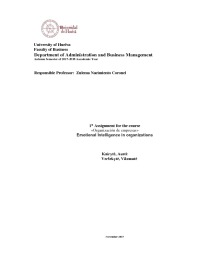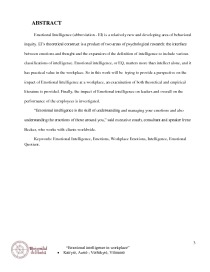Emotional Intelligence



Content. Abstract. The importance of emotional intelligence in organizations. The Direct Effect of EI in the Workplace. Historical development of ei. Current research trends in ei within organizations main researchers, tools for research on this topic and findings. Ie research findings used by companies to make better the workplace. References. Questionnaries to mesure ei.
▪Self-awareness
The ability to recognise what you are feeling, to understand your habitual emotional responses to events and to recognise how your emotions affect your behaviour and performance.
When you are self-aware, you see yourself as others see you, and have a good sense of your own abilities and current limitations.
▪Managing emotions
The ability to stay focused and think clearly even when experiencing powerful emotions. Being able to manage your own emotional state is essential for taking responsibility for your actions, and can save you from hasty decisions that you later regret.
▪Motivating oneself
The ability to use your deepest emotions to move and guide you towards your goals. This ability enables you to take the initiative and to persevere in the face of obstacles and setbacks.
▪Empathy
The ability to sense, understand and respond to what other people are feeling.
Self-awareness is essential to having empathy with others. If you are not aware of your own emotions, you will not be able to read the emotions of others.
- Management Papers
- Microsoft Word 200 KB
- 2018 m.
- English
- 22 pages (5416 words)
- University
- Auste

















